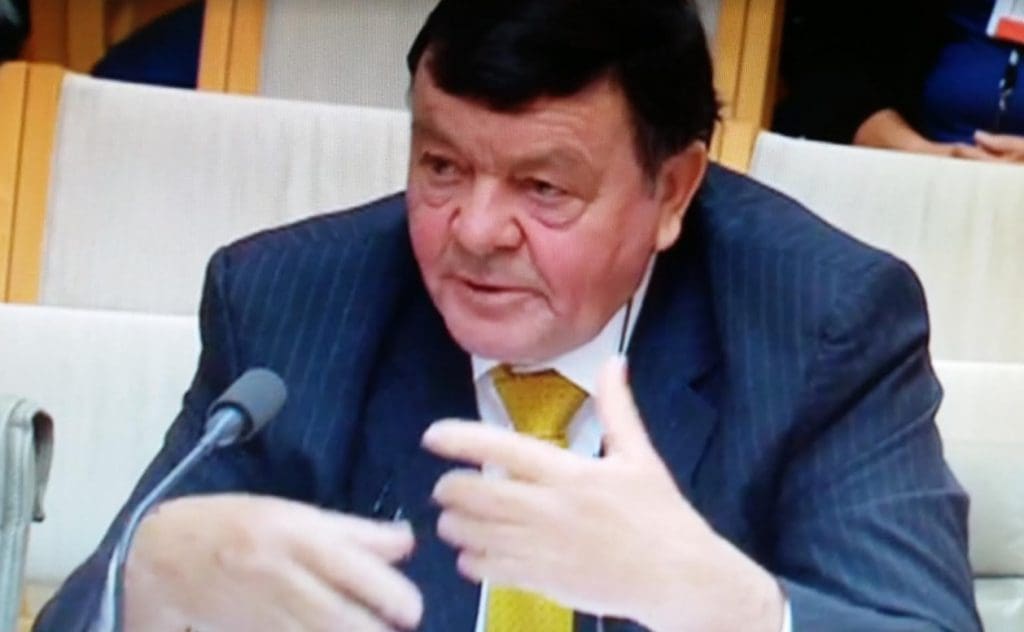
Former AWI chairman Wal Merriman at a Senate Estimates hearing.
FORMER Australian Wool Innovation chairman Wal Merriman will seek re-election at this year’s director election and has ignored an opportunity to rule out re-standing for the body’s top role.
Mr Merriman stood down as AWI chair late last year, ushering in his deputy Colette Garnsey to the role, as the industry negotiated with AWI on whether to put key governance issues — including a 10-year director tenure proposal — to a now abandoned extraordinary general meeting.
The 2019 AWI director’s poll will be the first time since 2006 that Mr Merriman has been in a contested election, with several industry people now seeking their 100 levy-holder signatures to qualify as nominees.
Sheep Central understands that under AWI’s constitution a third of its directors must stand down this year, which would include current board members Mr Merriman, fellow New South Wales director Meredith Sheil and Western Australian director David Webster.
AWI has refused to confirm this for “privacy reasons”, claiming it is standard practice to treat retiring directors similar to people seeking their 100 shareholder signatures to secure an external nomination ie. to not name them until aspiring candidates have successfully completed all of the nomination formalities.
“AWI would expect to be in a position to confirm all of the candidates for election after the end of the nomination period which is from Friday September 6, 2019 to Tuesday September 24, 2019.”
However, at the Australian Sheep and Wool Show at the weekend, Mr Merriman reluctantly admitted to Sheep Central that he would be standing for re-election.
“They know I am standing”, he said.
Industry speculation is also rife that Mr Merriman might seek to return to the body’s top role if re-elected. When asked at the weekend if he would accept a nomination to re-stand for the chair’s role, Mr Merriman said “one thing at a time” and then “the current chair has my full support,” before walking away. However, he did not specifically rule out accepting a future nomination for the body’s top role. The AWI chair and vice chair roles are declared vacant when a new board is elected.
Mr Merriman earlier this year told Sheep Central that Ms Garnsey had his “full support” when he rejected reports he had supposedly told people at the 88th International Wool Textile Organisation Congress in Venice last April he would be seeking the AWI chair role again.
At least four people are known to be seeking signatures to become candidates in the 2019 AWI election, including former board member Paul Cocking, New South Wales veterinarian Michelle Humphries, former AWI director and Australian Wool Growers Association Chick Olsson and former South Australian researcher and now full-time wool grower Janelle Hocking Edwards.
Mr Webster would not answer questions at the sheep show last weekend, but Western Australian Merino breeder Steve Bolt and another breeder told Sheep Central they believed Mr Webster would be standing. Ms Sheil has confirmed she will be retiring and not standing for re-election this year.

Cultural change is essential for growth. The EY report recommendations must be adopted.
Littleproud failed, will McKenzie also be a coward?
Agree with your comments Andrew. The new minister must address where she sits on the EY report recommendations. I would think it’s going to be virtually impossible for any new and innovative representatives to get the 100 signatures currently required to nominate. Removing that requirement, as strongly recommended by the EY report, is essential for cultural change.
As a tax and AWI levy payer, I have a few concerns with the lack of leadership and outcomes from the EY review.
Question 1: How much did the EY review cost tax and levy payers?
Question 2: Our previous Minister for Agriculture said he expected all the 82 recommendations of the EY review to be adopted. Does our new Minister for Agriculture expect the same?
Question 3: With the election for three positions on the AWI board in November, are we going to see any new and innovative representatives seeking nomination?
Is there anything in this report that is surprising? If not, you might ask yourself why that is so.
Good to hear Wally. At least your organisation is democratic and has elections for the farmer directors of AWI. RMAC’s White Paper for the red meat industry (including sheep meat producers) has all directors nominated to the new board from peak industry councils and none elected by levy payers. Grass-fed cattle producers are locked out of advocacy and decisions about how to spend the $60 million levies we pay each year. Those who pay must have a say.